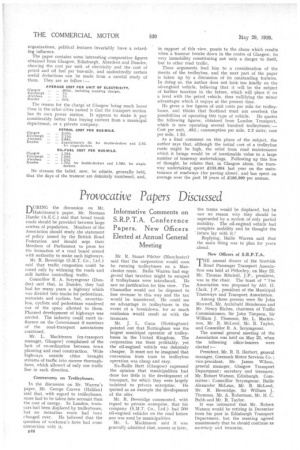Provocative Papers Discussed
Page 58

If you've noticed an error in this article please click here to report it so we can fix it.
DURING the discussion on Mr. Hutchinson's paper, Mr. Norman _Hardie (A.E.C.) said that broad trunk roads should be provided between large centres of population. Members of the Association should study the statement of policy issued by the British Road Federation and should urge their Members of Parliament to press for the formation of a road board armed with authority to make such highways.
Mr. R. Beveridge (S.M.T. Co., Ltd.) said that traffic congestion could be cured only by widening the roads and still further controlling traffic.
Councillor R. A. Scrymgeour (Dundee) said that, in Dundee, they had had for many years a highway which was divided into tracks for pedestrians, motorists and cyclists, but, nevertheless, cyclists and pedestrians wandered out of the space allotted to them. Planned development of highways was needed. The industry could exert influence on the Government if members of the road-transport associations combined.
Mr. L. Mackinnon (ex-transport manager, Glasgow) complained of the lack of co-ordination between town planning and road construction. Wide highways outside cities brought streams of traffic into narrow thoroughfares, which allowed of only one traffic line in each direction.
Controversy on Trolleybuses.
In the discussion on Mr. Warren's paper, Mr. George Craven (Halifax) said that, with regard to trolleybuses, snore had to be taken into account than the cost of energy. In London, tramcars had been displaced by trolleybuses, but no motorbus route had been changed over. He believed that the question of workmen's fares had some connection with it.
844 Mr. R. Stuart Pilcher (Manchester) said that the corporation would soon be running trolleybuses on a Manchester route. Bailie Warren had suggested that taxation might be escaped if trolleybuses were introduced. He saw no justification for this view. The Chancellor would not be disposed to lose revenue in this way and the tax would be transferred. He could see no advantage in trolleybuses in the event of a breakdown, for as much confusion would result as with the tramcars, Mr. J. L. Gunn (Nottingham) pointed out that Nottingham was the largest municipal operator of trolleybuses in the United Kingdom. The corporation ran them profitably, yet the oil-engined vehicle was definitely cheaper. It must not be imagined that conversion from tram to trolleybus operation was cheap and easy.
Ex-Bailie Burt (Glasgow) expressed the opinion that municipalities had done too little in the development of transport, for which they were largely indebted to private enterprise. He quoted as an example the development of the oiler.
Mr. R. Beveridge commented, with regard to private enterprise, that his company (S.M.T. Co., Ltd.) had fi(g) oil-engined vehicles on the road before any was used by municipalities.
Mr. L. Mackinnon said it was generally admitted that, sooner or later,
the trams would be displaced, but he saw no reason why they should be superseded by a system of only partial mobility. The oil-engined vehicle had complete mobility and he thought the future lay with it.4
Replying, Bailie Warren said that the main thing was to plan for years ahead.
New Officers of S.R.P.T.A. -r-HE annual dinner of the Scottish I Road Passenger Transport Association was held at Pitlochry, on May 22. Mr. Thomas Mitchell, J.P., president, was in the chair. The toast of "Ihe Association was proposed by Aid. H. Clark,. J.P., president of the Municipal Tramways and Transport Association.
Among those present were Sir John Maxwell, Mr. Archibald Henderson and Mr. Henry Riches, chairmen of Traffic Commissioners. Sir John Timpson, Sir William J. Thomson, Mr. L. Mackinnon, Mr. R. McLeod, Mr. R. Taylor, and Councillor R. A. Scrymgeour.
The annual general meeting of the Association was held on May 23, when the following office-bearers were elected :— President, Mr. R. B. Herbert, general manager, Greenock Motor Services Co. ; vice-president, Mr. James Wilson, general manager, Glasgow Transport Department ; secretary and treasurer, Mr. Robert Watson, Edinburgh. Committee: Councillor Scrymgeour, Bailie Alexander McLean, Mr. R. McLeod, Mr. R. Beveridge, Sir William J. Thomson, Mr. A. Robertson, Mr. H. C. Babb and Mr. R. Taylor.
It was intimated that Mr. Robert Watson would be retiring in December from his post in Edinburgh Transport Department, but the meeting agreed unanimously that he should continue as secretary and treasurer.




























































































